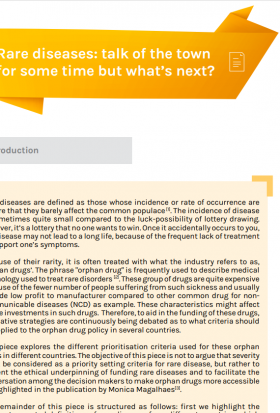This website uses cookies so that we can provide you with the best user experience possible. Cookie information is stored in your browser and performs functions such as recognising you when you return to our website and helping our team to understand which sections of the website you find most interesting and useful.
Policy Brief Issue 26: Rare diseases – Talk of the Town for Some Time but What’s Next?

รายละเอียดเพิ่มเติม
Because of their rarity, rare diseases are often treated with what the industry refers to as
‘orphan drugs’. These group of drugs are quite expensive because of the fewer number of people suffering from such sickness and usually provide low profit to manufacturer compared to other common drug for non-communicable diseases (NCD) as example. These characteristics might affect future investments in such drugs. Therefore, to aid in the funding of these drugs, legislative strategies are continuously being debated as to what criteria should be applied to the orphan drug policy in several countries.
This policy brief explores how the different prioritisation criteria used for these orphan drugs in different countries.




